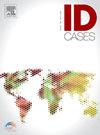Severe Legionnaires’ disease refractory to azithromycin: Are quinolones superior to macrolides?
IF 1
Q4 INFECTIOUS DISEASES
引用次数: 0
Abstract
Legionnaires’ disease is typically treated with either a macrolide or fluoroquinolone. Antimicrobial sensitivity testing of clinical samples is not routinely done because Legionella is difficult to culture. Controlled trials to suggest non-inferiority of either class are limited. We present a case of a 43-year-old immunosuppressed man with severe Legionella pneumonia whose clinical course was complicated by persistent fevers, acute metabolic encephalopathy, septic shock, rhabdomyolysis, and acute kidney injury while on azithromycin. He rapidly improved after a switch to levofloxacin. The current guidelines recommend either using a quinolone or macrolide for Legionella pneumonia. However, there are conflicting data suggestive of a benefit of quinolones over macrolides. Our case prompts the question of optimal antibiotic choice in cases of severe Legionnaires’ disease in immunocompromised patients and highlights the need for randomized controlled trials for further guidance.
阿奇霉素难治性严重军团病:喹诺酮类药物优于大环内酯类药物吗?
军团病通常用大环内酯类药物或氟喹诺酮类药物治疗。由于军团菌难以培养,临床样品的抗菌药物敏感性测试没有常规进行。表明这两类非劣效性的对照试验是有限的。我们报告一个43岁的免疫抑制男性严重军团菌肺炎的病例,其临床过程并发持续发热,急性代谢性脑病,感染性休克,横纹肌溶解和急性肾损伤,同时使用阿奇霉素。改用左氧氟沙星后病情迅速好转。目前的指南建议使用喹诺酮类药物或大环内酯类药物治疗军团菌肺炎。然而,有相互矛盾的数据表明喹诺酮类药物优于大环内酯类药物。我们的病例提示了在免疫功能低下患者的严重军团病病例中选择最佳抗生素的问题,并强调需要进行随机对照试验以进一步指导。
本文章由计算机程序翻译,如有差异,请以英文原文为准。
求助全文
约1分钟内获得全文
求助全文

 求助内容:
求助内容: 应助结果提醒方式:
应助结果提醒方式:


